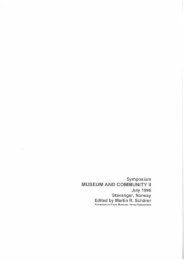Key Concepts of Museology - ICOM
Key Concepts of Museology - ICOM
Key Concepts of Museology - ICOM
You also want an ePaper? Increase the reach of your titles
YUMPU automatically turns print PDFs into web optimized ePapers that Google loves.
42<br />
5. The institution <strong>of</strong> heritage<br />
also has its detractors: people who<br />
question its origins and the abusive<br />
‘fetishist’ value attached to the forms<br />
<strong>of</strong> the underlying culture, in the<br />
name <strong>of</strong> western humanism. In the<br />
strictest sense <strong>of</strong> the word, that is to<br />
say in the anthropological sense, our<br />
cultural heritage is only made up <strong>of</strong><br />
very modest practices and skills. To<br />
a far greater extent it depends on the<br />
ability to make and use these tools,<br />
especially when these are fi xed as<br />
objects inside a museum showcase.<br />
Too <strong>of</strong>ten we forget that the most elaborate<br />
and powerful tool invented by<br />
man is the concept, the instrument<br />
for developing thought, which is very<br />
diffi cult to arrange in a showcase.<br />
Cultural heritage understood as the<br />
sum total <strong>of</strong> the common evidence <strong>of</strong><br />
humankind has been severely criticised<br />
for being a new dogma (Choay,<br />
1992) in a society which has lost its<br />
religious bearings. It is possible,<br />
moreover, to list the successive stages<br />
<strong>of</strong> building this recent product: heritage<br />
reappropriation (Vicq d’Azyr,<br />
1794), spiritual connotation (Hegel,<br />
1807), mystical, disinterested connotation<br />
(Renan, 1882) and fi nally,<br />
humanism (Malraux, 1947). The<br />
notion <strong>of</strong> collective cultural heritage,<br />
which only transposes the legal and<br />
economic lexicon to the moral fi eld,<br />
appears suspicious, to say the least,<br />
and can be analysed as being part <strong>of</strong><br />
that which Marx and Engels called<br />
ideology, that is to say a by-product<br />
<strong>of</strong> a socio-economic context intended<br />
to serve special interests. “The<br />
internationalisation <strong>of</strong> the concept<br />
<strong>of</strong> heritage is […] not only false, but<br />
dangerous in so far as one imposes a<br />
whole set <strong>of</strong> knowledge and prejudices<br />
whose criteria are the expression<br />
<strong>of</strong> values built on aesthetic, moral,<br />
and cultural received ideas, in short<br />
an ideology <strong>of</strong> a caste in a society<br />
whose structures are not compatible<br />
with those <strong>of</strong> the third world in<br />
general and Africa in particular”<br />
(Adotevi, 1971). It is all the more<br />
suspect because it coexists with the<br />
private nature <strong>of</strong> economic property<br />
and seems to serve as the consolation<br />
prize for the deprived.<br />
DERIVATIVES: HERITOLOGY, INHERITANCE.<br />
CORRELATED: COMMUNITY, CULTURAL PROPERTY,<br />
CULTURAL RELIC, EXHIBIT, EVIDENCE, IDENTITY, IMAGE,<br />
LEGACY, LIVING HUMAN TREASURE, MATERIAL CULTURE,<br />
MEMORY, MESSAGE, MONUMENT, NATIONAL TREASURE,<br />
OBJECT, PATRIMONY, REALITY, SEMIOPHORE (SEE<br />
OBJECT) SUBJECT, TERRITORY, THINGS, VALUE, WITNESS.
















